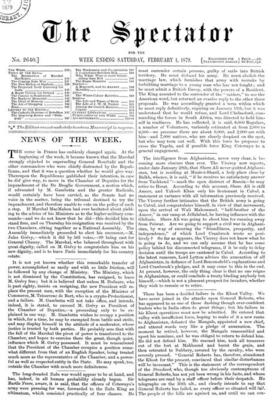There has been a decided failure in the Khost Valley.
We have never joined in the attacks upon General Roberts, who has appeared to us one of those dashing though over-confident leaders who in India often do great things ; but his failure in his Khost operations must now be admitted. He entered that valley with insufficient force, hoping to make of it a new route to Afghanistan, defeated the Mangals, appointed a new chief, and uttered words very like a pledge of annexation. The moment he retired, however, the Mangals reassembled and. upset his nominee, and he was obliged to return to defend him. He did not defend him. He rescued him, took all treasures out of the fort at Makhoond and burnt the grain, and then retreated to Subbery, covered by the cavalry, who were severely pressed. "General Roberts has, therefore, abandoned the Khost for the present, convinced that similar disturbances will be incessant." This is the statement of the correspondent of the Standard, who, though too obviously contemptuous of General Roberts, has not yet been wrong in his facts, and whose telegrams are read by a staff officer before their despatch. He telegraphs on the 30th ult., and clearly intends to say that General Roberts has failed, as every officer so situated will fail. The people of the hills are against AB, and until we can con- ciliate them, or bridle them with permanent garrisons, we shall be masters only of the ground we stand on. We do not believe cnneilliatien impossible, if we raise native Highland regimeatts, tad -the .popular idea of otir successes is unfounded. A Britiah 'force noatlaaveat of the Snleiman passes anywhere, like a knife through water. But you cannot cut water, and the knife rusts.



































